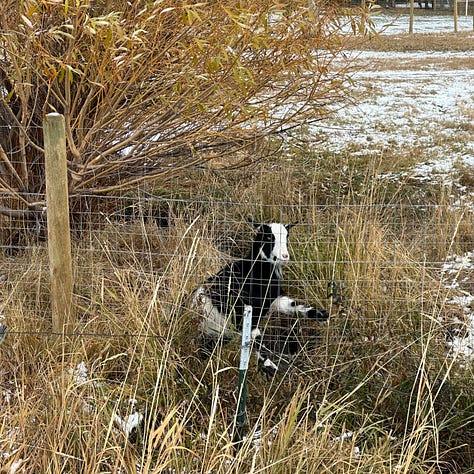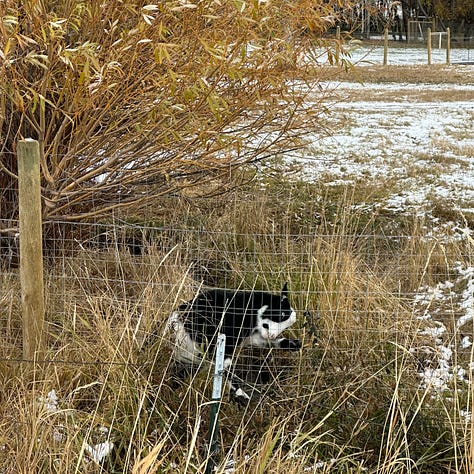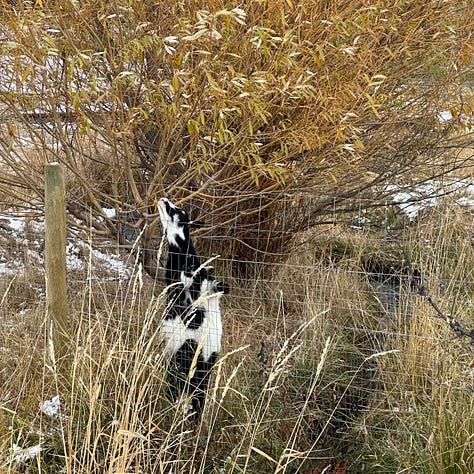Vignettes From the Human Experience: Relationships, the Goat, and "Being Active for Yourself"
A thoughtful question, tolerating asymmetry in early relationships, and even in the 1800s it didn't suit some to work for someone else
We’re smack-dab in the middle of a family situation which has turned the last week and potentially some upcoming weeks upside down. And with this post going out on Election Day, it felt like just the right day to share a few thoughts and vignettes about things that matter to all of us: great questions, relationships, goats (or appreciating the small things we observe in our daily lives), and “being active for yourself.”
People who get it
“How does it feel?” A friend from college and I have recently begun using Marco Polo to catch-up on each other’s lives. Right at the outset, we agreed that neither of us needs to feel obliged to respond to every single thing shared by the other, because that can get really old. And that we can listen to and care about all the other person’s updates without repeating them back to the other. Maybe all that work on expectation setting and honest communication is paying off with mature conversations such as this.
Said friend and I have shared all kinds of interesting questions and updates back and forth and found similarities we didn’t know we had at this stage in our life. On the list of things we talked at least briefly about included some osteoarthritis issues for me. We’re solidly in our 40s now and this is the kind of thing we talk about. It’s not my first rodeo with joint issues, and I try to not be a health complainer in general—I’m saving that party for later in life—so I shared the issues briefly and maybe even dismissively.
When my friend responded with compassion and asked questions she actually wanted answers to, I was touched. “Does it hurt?” she asked. “What does it feel like?” What a gift of a question! Instead of extrapolating from her own experiences or assuming she knows what it feels like or glossing over it, she wanted to know what my situation felt like for me. I find myself thinking about it again and again, and why she has that rare ability to ask such a beautiful question. My conclusion: she has plumbed the depths of her soul, and knows a thing or two about suffering. She’s wrestled with big and hard and deeply personal things in her life, and is able to show compassion to others in their hards.
Asymmetry in early relationships:
The latest podcast episode of Being Well1 got me thinking about some of my past romantic relationships. In a portion of the episode, the hosts were discussing a listener’s question about the embarrassment they felt after learning the romantic feelings they had for a friend were not reciprocated.
Forrest and Rick were talking about the fact that it’s very common in early-stage relationships for one person to like the other person more than they are liked. I’ve wondered before—and their conversation renewed that wondering—whether a handful of guys I’ve dated might’ve been able to eventually capture more of my heart if they’d been more willing to tolerate an initial asymmetry in interest.
Here are transcript notes for your reading pleasure:
Dr. Rick Hanson: [00:23:00] …And a thing about relationships that is sort of a taboo thing to name, is that in most relationships, especially in the beginning stages, there's an asymmetry of desire. One person often likes the other person more than they're liked.
Forrest Hanson: [00:23:19] Very normal.
Dr. Rick Hanson: [00:23:19] Yeah. And then, but that asymmetry-
Forrest Hanson: [00:23:22] Not just normal, like 90% of cases if not, yeah.
Dr. Rick Hanson: [00:23:25] Okay, okay, that's-
Forrest Hanson: [00:23:26] For sure, overwhelmingly normal. Yeah.
Dr. Rick Hanson: [00:23:28] And then, what do you do with the asymmetry? And a lot of times people disappear it as a fact because it's, they don't want to talk about it, they act like it's not true, but it really is an asymmetry, and if you could just talk about it, it then becomes not so much a problem; in other words, does it have to be a problem for me if you like me more than I like you? As long as you're not a jerk about it, it's not inherently a problem, and I'm open to discovering that I may eventually like you more than I currently like you, it doesn't have to be a problem.
What have you observed or what have your experiences been in asymmetry in relationships? Could some patient courting have allowed you to discover you actually like the instigator more than you did at first?
The goat who could



This goat made my morning walk. One bonus of being unexpectedly home in Montana is that I have access to the glorious walking trails around my parents’ home. The tenacious way this creepy beaut of a goat went about finding fresh stuff to eat was positively inspiring. But given its tenacity and piercing blue eyes (not well captured in this photo), I was a tiny bit grateful to have a fence between us.
From The Prime Minister
Anthony Trollope wrote in the mid-1800s and has become one of my favorite novelists. Especially in our busy, noisy times, it’s become important to me to read old and substantial things. This passage from The Prime Minister about Ferdinand Lopez’s* relationship with one of my favorite themes—how people approach work (particularly employment and self-employment)—caught my eye:
“…at the age of seventeen he had been sent to a German University, and at the age of twenty-one had appeared in London, in a stockbroker's office, where he was soon known as an accomplished linguist, and as a very clever fellow,—precocious, not given to many pleasures, apt for work, but hardly trustworthy by employers, not as being dishonest, but as having a taste for being a master rather than a servant. Indeed his period of servitude was very short. It was not in his nature to be active on behalf of others. He was soon active for himself, and at one time it was supposed that he was making a fortune. Then it was known that he had left his regular business, and it was supposed that he had lost all that he had ever made or had ever possessed. But nobody, not even his own bankers or his own lawyer,—not even the old woman who looked after his linen,—ever really knew the state of his affairs.
Okay, that’s it for this week. I hope you enjoyed this smattering of thoughts and perspectives on things we humans all have in common, have had in common, and will have in common for centuries to come—wanting to be seen, wanting to be in relationships and grappling with the risk implicit in them, looking for the interesting or funny or unique or beautiful, and the way we make our way in the world of work.
P.S. Spoiler alert: I think Ferdinand ends up being a villain, but I don’t know that for sure. Plus, it doesn’t change the fact that Trollope wrote into his novels what he saw happening around him in 1800s England, and even then people wanted to be able to be active for themselves.
November 4, 2024 episode called “Attachment, Boundaries, and Finding Yourself: Relationship Mailbag”



Oh, that Ferdinand!